TABLE OF CONTENTS |
Part
I
Prelude to the Trumpets |
Part
II
The 1st Trumpet
The 2nd Trumpet
The 3rd Trumpet
The 4th Trumpet
The 5th Trumpet
The 6th Trumpet
The 7th Trumpet
|
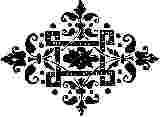
Part I
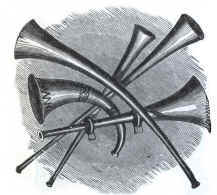
|
Trumpets were used extensively in yesteryear to deliver critical messages. The trumpet
sound carried further and clearer than the human voice. Therefore it was necessary to use
the trumpet to signal what was to be done.
|
When Gideon defeated the Midianites, he used 300 trumpets in
conjunction with a similar number of pitchers and lamps (Judges 7:22). His trumpet message
signaled to the enemy that a vast host was charging down upon them, setting them into
disarray. The enemy did not know that was all there was—just three hundred men
blowing trumpets. You know the rest of the story.
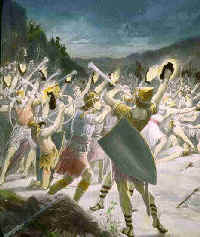
Gideon's Band of 300
|
The trumpet was the means of delivering various messages. This is
what the "seven trumpet" messages are all about. The "trumpet"
messages are not recorded, so they must be filled in by history. The seventh
"trumpet" message is the exception because we have in our time a complete record
of the seventh message.
Revelation carefully records what happens when each "trumpet"
message is delivered.

Revelation 8:2-5 Portrays
Christ’s Work
During the Jewish Harvest—
A Prelude to the Trumpets
"And I saw the seven angels which stood before God; and to them were given seven trumpets." Revelation 8:2
The "seven angels" are the same as mentioned in
Revelation 1:20: "The seven stars are the angels of the seven churches." Bible
Students generally agree that the angels are Paul (who ascended over Peter as the
messenger of the Ephesus period), John the Apostle, Arius, Waldo, Wycliff, Luther and
Russell.
Some might submit a different list, but most Bible Students would agree
with this list. While there may be other men who might measure up in some manner to
those designated, it is important to pick out men who delivered a message to the Christian
world which was heard and which caused reactions and repercussions in the time they were
delivered.
The seven messengers were given "seven trumpets."
The messengers either had the ability or were given the ability to blow the
"trumpets" provided.
The "seven trumpets" were divinely provided. This
means these "seven angels" were placed in positions by the Lord so that their
messages would be effective in reaching the Christian world at the appointed time. The
"seven angels" could not deliver their message until provided with the means to
do so. The same is true with the "seven last plagues." Before they can be poured
out, the Lord has to provide the "seven bowls" for delivering these judgments.
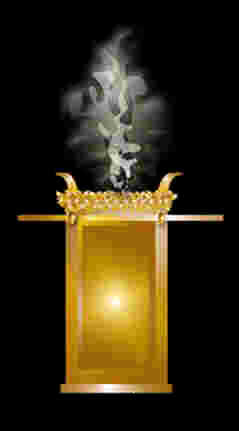
The Incense Altar
|
"And
another angel [messenger, Christ] came and stood at the altar [God’s
altar where acceptable sacrifice was offered], having a golden censer [the
divine will to sacrifice as a New Creature his full ability].
"And there was given unto him much incense [perfect ability and will, his
two hands full, to offer to God], that he should offer it [fulfill his
vows of consecration as a New Creature] with the prayers of all saints upon the
golden altar [where New Creatures' sacrifices are made] which was before
the throne [the divine authority]."
Revelation 8:3
|
This verse pictures
Christ at the outset of his ministry presenting himself as our High Priest. In Exodus
30:7, 8 we learn that the High Priest offered incense twice daily when he dressed the
lamps. The High Priest also offered two hands full of incense when he went in to make
atonement with the blood of the bullock. Since blood is not mentioned, it indicates
that this is not the primary focus of the story.
The lesson is that of acceptable sacrifice before the throne. On the
Day of Atonement the High Priest offered "two hands full of incense," showing
his total powers being presented. Much "incense" is provided that Christ should
"offer with the prayers of all saints upon the golden altar."
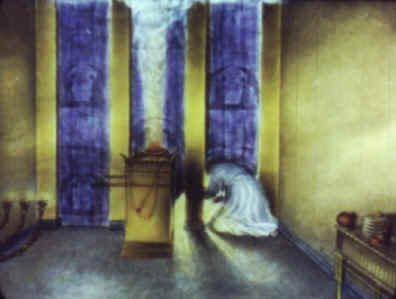
"And the smoke of the incense, which came with the prayers of
the saints, ascended up before God out of the angel’s hand."
Revelation 8:4
|
Our prayers would not be acceptable without the "incense" of Christ’s
perfect sacrifice. "All saints" must, therefore, pray in Jesus' name (John
14:13).
The "golden censer" carried the fire needed to offer incense.
God provided the trials and the circumstances through which our High Priest offered
incense that was totally acceptable to God. |
Because of Jesus’ sacrifice the prayers of
Christ’s disciples ascended to God. Starting at Pentecost, prayers of the saints
would be heard if they were offered with the "smoke" or memory of Jesus’
sacrifice. They ascended through Christ’s "hand," or power.
"And the angel took the censer, and filled it with fire of the altar, and cast
it into the earth: and there were voices, and thunderings, and lightnings, and an
earthquake." Revelation 8:5
John the Baptist said of Jesus that he "shall baptize you with
the Holy Spirit and with fire" (Luke 3:16). Following the outpouring of his Spirit on
his servants and handmaidens of the Jewish nation, the fiery judgments came upon the
nation leading to the collapse of the Jewish polity in CE 70 and afterward.
The "voices" (proclamations), "thunderings"
(controversies), "lightnings"
(illuminations) and an "earthquake"
(an
earthquake occurred at Christ’s death and cast its shadow before it of the terrible
shaking and demise of the Jewish nation) described the work of the Jewish harvest time.
"And the seven angels which had the seven trumpets prepared themselves to
sound."
Revelation 8:6
Each of the "seven angels"
(messengers) which had been
provided with the means to deliver their message are prepared to sound forth their message
in their appointed time. What they proclaimed is not stated. However, the history of each
period helps us learn of their work and ministry.
The seven messengers were prepared to sound by having received a
message from Jesus, who addressed the "seven angels" of the "seven
churches." Jesus, who had opened the "seven seals," knew what conditions
would prevail during each successive church, and was thus able to deliver the message
through its "angel."